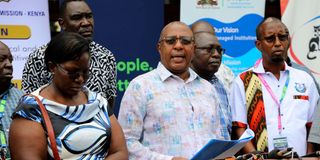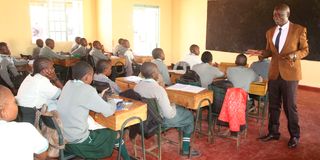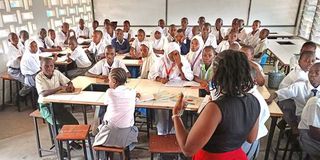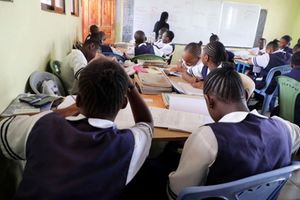
Kenya Secondary Schools Heads Association chairman Willy Kuria (centre) and other officials address the press at the start of the 48th annual summit in Mombasa on June 23, 2025.
Geography and business studies are the most preferred subjects by learners in Grade Nine for study in Grade 10 (senior school) next year.
According to head of the Directorate of Secondary Education at the Ministry of Education, William Sugut, electricity, woodwork and metalwork attracted the least number of students.
The children are selecting subject combinations to fit in the three pathways in senior school – Science, Technology, Engineering and Mathematics (Stem); Social Sciences; and Arts and Sports.
However, national schools will offer the triple pathways due to due to capacity and infrastructure.
During the ongoing Kenya Secondary Schools Heads Association summit in Mombasa, Dr Sugut said only a few schools offer some subject combinations, adding that some learning institutions would not have certain combinations.
“We are not choosing the school but combinations. Some people want to start from the school but that is not possible,” he said.
“Tell the learners to start with the pathway, followed by the combination. Schools that offer the combinations will pop up. They can then make selection from there.”
Dr Sugut added that 9,606 senior schools have already selected subject combinations ahead of the transition of the pioneer cohort of competency-based education learners.
He said the subject combinations have been approved by sub-county education directors in consultation with quality assurance officers.
However, some 1,369 senior schools still lack laboratories for subjects that require practical work.
“They need 1,609 laboratories and we are working on addressing the challenge,” Dr Sugut said.

Kakamega Primary School and Junior Secondary School Grade 9 learners during a lesson on January 6, 2025. Learners are expected to pick their senior schools before undertaking the Kenya Junior School Education Assessment in November.
He gave the principals two days to revise subject combinations in consultation with sub-county education chiefs. The portal will then be closed to allow junior schools capture their data.
Dr Sugut told the principals to ensure talents of every learner are taken into consideration.
“If we are not careful, we will be back to where we have always been. Kenyans will demand to be told why we initiated the changes,” he told the conference.
He urged the principals to put in mind time-tabling as they select the combinations.

Junior secondary school learners are taken through a science lesson inside a lab at Bomu Primary School in Changamwe, Mombasa County, in January this year.
“Some learners may be good in every subject, but allow them to choose. Advise them on the choices to be made,” Dr Sugut said.
Last week, the ministry began sensitising education players on helping Grade Nine learners select career pathways. The exercise will last a month.
Placement to senior school will be based on a learner’s choice in terms of pathways, tracks, subject combination and merit.
The learner’s academic performance in Grade Nine will be cumulative, having undertaken assessments in Grade Six, Seven and Eight. Formative and summative assessments will count.
Learners pursue nine learning areas in junior school and undertake seven subjects at senior level – four of which will be compulsory, including mathematics and languages.
He told heads to familiarise themselves with curriculum designs for Grade 10, 11 and 12.







